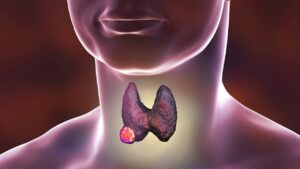Thyroid Disease
 A little gland called the thyroid is found near the front of the neck, wrapped around the trachea. It has two broad wings that wrap around the side of your throat and is fashioned like a butterfly with a smaller Centre. a gland, the thyroid is. Your body contains glands, which produce and release compounds that aid various bodily functions. Your thyroid produces hormones that assist in regulating a number of important bodily processes.
A little gland called the thyroid is found near the front of the neck, wrapped around the trachea. It has two broad wings that wrap around the side of your throat and is fashioned like a butterfly with a smaller Centre. a gland, the thyroid is. Your body contains glands, which produce and release compounds that aid various bodily functions. Your thyroid produces hormones that assist in regulating a number of important bodily processes.
If your thyroid isn’t working properly, it could have an impact on your entire body. A condition known as hyperthyroidism can develop if your body makes too much thyroid hormone. Your body generates insufficient thyroid hormone if you have hypothyroidism. Given the severity of these conditions, medical attention is needed.
SYMPTOMS
If you have thyroid disease, you could encounter a wide range of symptoms. Unfortunately, thyroid disease symptoms frequently closely resemble those of other illnesses and life stages. This can make it challenging to determine if your symptoms are caused by a thyroid condition or something completely different.
Generally speaking, there are two categories of symptoms associated with thyroid disease: those associated with hyperthyroidism and those associated with hypothyroidism, or having too little thyroid hormone.
Hyperthyroidism
- Feeling worried, agitated, and anxious
- Feeling too sensitive to heat
- Having trouble sleeping
- Losing weight
- Having an enlarged thyroid gland or a goiter
- Muscle weakness and tremors
- Having irregular menstrual periods or having your menstrual cycle end
- Having vision issues or eye irritation.
Hypothyroidism
- Feeling exhausted (fatigue)
- Gaining weight
- Forgetfulness
- Frequent and heavy menstrual cycles
- Dry and coarse hair
- Hoarse voice, and
- Intolerance to cold temperatures
Causes
Hypothyroidism and hyperthyroidism are the two primary forms of thyroid illness. Both problems can be brought on by other illnesses that affect the thyroid glands functionality.
Conditions that can cause hypothyroidism
Thyroiditis: The thyroid gland is inflamed (swelling) in this disorder. Your thyroid’s ability to generate hormones can be reduced by thyroiditis.
Hashimoto’s thyroiditis: Hashimoto’s thyroiditis, an autoimmune illness where the body’s cells assault and harm the thyroid, is a painless disease that is inherited.
Postpartum thyroiditis: This condition occurs in 5% to 9% of women after childbirth. It’s usually a temporary condition.
Iodine deficiency: The thyroid uses iodine to make hormones. Around the world, many million people suffer from an iodine shortage.
A non-functioning thyroid gland: The thyroid gland occasionally functions improperly from birth. About 1 in 4,000 neonates are impacted by this. The youngster may have physical and mental problems in the future if untreated. In the hospital, a screening blood test is administered to all infants to check their thyroid function.
Conditions that can cause hyperthyroidism
Graves’ disease: In this illness, the thyroid gland as a whole may be overactive and release an excessive amount of hormone. The term diffuse toxic goiter (enlarged thyroid gland) is another name for this issue.
Nodules: Nodules in the thyroid that are hyperactive might result in hyperthyroidism. A goiter with several nodules is referred to as a toxic multi-nodular thyroid nodule, whereas a single lesion is known as a toxic autonomously functioning thyroid nodule.
Thyroiditis: This disorder can be either painful or not felt at all. In thyroiditis, the thyroid releases hormones that were stored there. This can last for a few weeks or months.
Excessive iodine: The thyroid produces more thyroid hormones than it requires when the body contains too much iodine, the mineral used to generate thyroid hormones. Cough syrups and some drugs, such as the heart medication amiodarone, contain excessive iodine.
Prevention
- Maintain a diet free of processed foods and sweets.
- Consume less cruciferous veggies.
- Look for methods to lessen your stress.
- Perform three to five workouts every week.
- Retain a healthy weight for your body.
